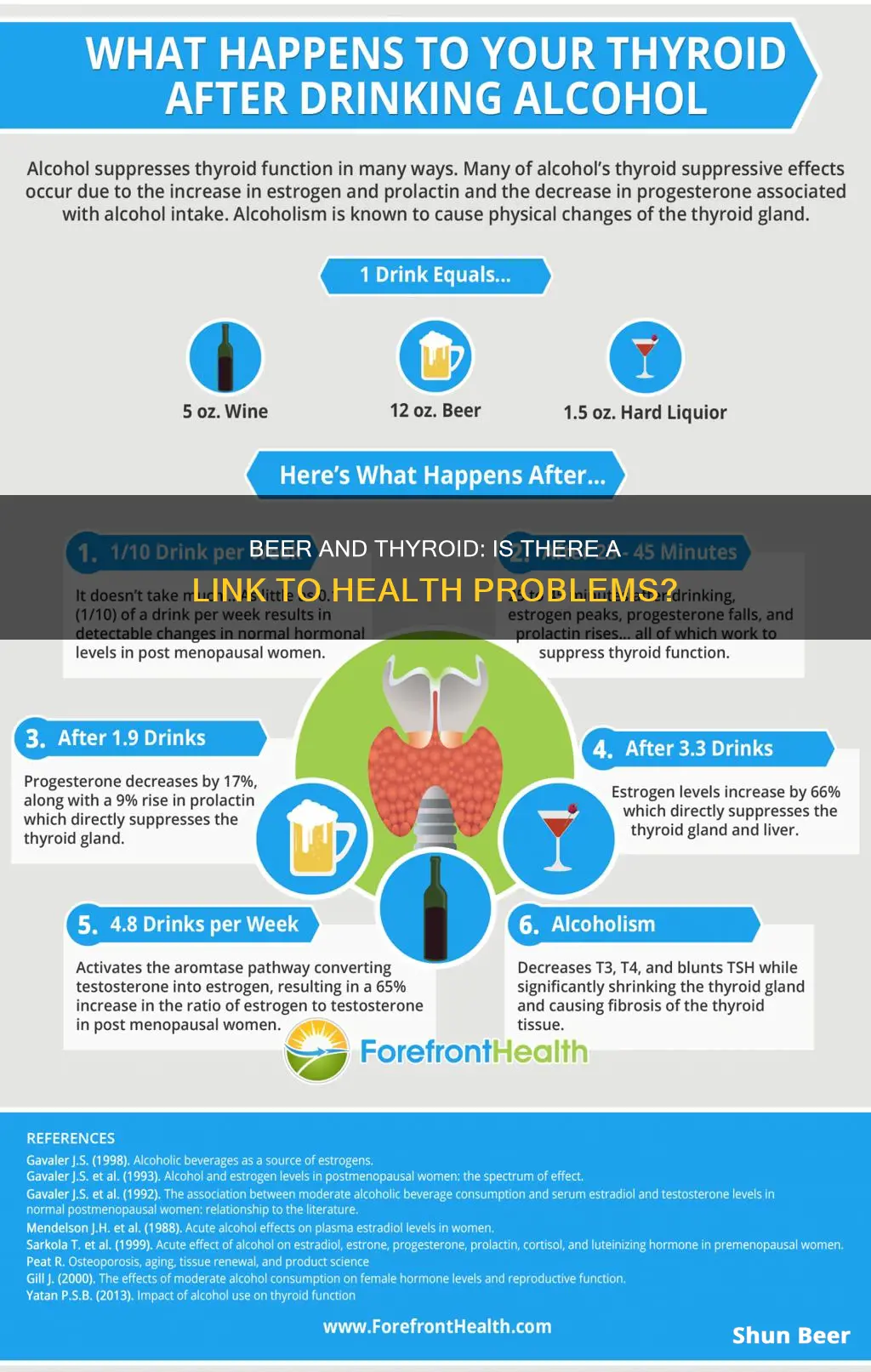
Alcohol is known to affect thyroid function, but the extent of its impact is still unclear. Studies have shown that moderate alcohol consumption may decrease the risk of hypothyroidism, while others have reported that alcohol causes cellular toxicity, directly suppressing thyroid function. The thyroid is a small, butterfly-shaped gland located in the lower front of the neck, and it plays a crucial role in regulating metabolism, development, and growth. Alcohol's impact on the thyroid can be direct, through acetaldehyde, a chemical involved in hangovers, and indirect, through its effects on the liver and adrenal glands. The liver, being responsible for metabolising alcohol, can be overburdened by excessive drinking, impairing its ability to convert T4 into T3, which can lead to hypothyroidism. Additionally, alcohol's toxic effect on thyroid cells may reduce thyroid volume, possibly offering some protection against the development of goiter. While the relationship between alcohol consumption and thyroid health is complex, it is evident that excessive drinking can negatively impact thyroid function and exacerbate symptoms of thyroid disorders.
| Characteristics | Values |
|---|---|
| Alcohol's impact on thyroid function | Alcohol can affect thyroid function, but the specifics are unclear. Some studies show that moderate alcohol use decreases the risk of hypothyroidism. Other studies report that alcohol causes cellular toxicity, which results in a direct suppression of thyroid function. |
| Alcohol's impact on thyroid hormones | The thyroid gland produces three hormones: Triiodothyronine (T3), Tetraiodothyronine (T4), and the pituitary gland produces TSH, which helps regulate T3 and T4 hormones. Studies have found that alcohol causes direct cellular toxicity of thyroid cells, leading to reduced production of T3 and T4 hormones. |
| Alcohol's impact on thyroid conditions | Hypothyroidism occurs when the thyroid doesn't produce enough thyroid hormone. Hyperthyroidism is when the thyroid produces too much thyroid hormone. Alcohol may have an impact on hypothyroid-related symptoms, such as elevated blood cholesterol levels, muscle aches, tenderness, joint pain, heavier than normal or irregular menstrual periods, and a slowed heart rate. |
| Alcohol's protective effects | Alcohol may have a protective effect against thyroid nodularity, goiter, and thyroid cancer. Several studies have found that people who drink alcohol in moderation are less likely to develop autoimmune hypothyroidism and Graves' disease. |
| Alcohol's impact on thyroid cancer | Studies have found that light to moderate alcohol use may have a protective effect against thyroid cancer. However, heavier drinkers and people who have been drinking for more than 10 years don't seem to experience the same protective benefits. |
| Alcohol's impact on thyroid medications | Alcohol is not known to affect how levothyroxine works. However, it may worsen certain side effects such as headaches and sweating. |
What You'll Learn
- Alcohol can cause direct suppression of thyroid function by cellular toxicity
- Heavy drinking may worsen thyroid symptoms
- Alcohol can damage the liver, which is critical to thyroid hormone conversion
- Alcohol can cause an increase or decrease in thyroid hormone production
- Alcohol can lead to hypothyroidism, which can cause fatigue, weight gain and constipation

Alcohol can cause direct suppression of thyroid function by cellular toxicity
Alcohol can have a direct suppressive effect on thyroid function by causing cellular toxicity. Alcohol is known to cause direct cellular toxicity of thyroid cells, leading to reduced production of the thyroid hormones T3 and T4. This toxicity is caused by acetaldehyde, a chemical involved in hangovers, which is a metabolite of ethanol (the main chemical found in alcoholic drinks). Large amounts of acetaldehyde can lead to hypothyroidism, where the thyroid produces fewer hormones than are needed by the body.
The thyroid is a small, butterfly-shaped gland located in the lower front of the neck. It is part of the endocrine system and produces hormones that help regulate metabolism, development, and growth. These hormones are released into the bloodstream and travel to all parts of the body. The main hormone produced by the thyroid is thyroxine (T4). When the body needs more energy, the thyroid releases an additional hormone called triiodothyronine (T3).
The direct toxic effect of alcohol on thyroid cells can also lead to a reduction in thyroid volume (the sum of the volumes of both lobes of the thyroid gland). This reduction in thyroid volume is greater in those with alcohol dependence compared to healthy individuals. The severity of thyroid fibrosis in alcoholics correlates with the duration and total dose of alcohol consumed rather than peak blood levels. Studies have shown that chronic alcohol users have more fibrosis than acute binge drinkers.
The toxic effect of alcohol on the thyroid may also confer some protective benefits. For example, it has been suggested that alcohol consumption may protect against the development of goitre (an abnormal enlargement of the thyroid gland). In fact, ethanol ablation therapy, a treatment for thyroid nodules, uses alcohol to destroy tumours.
The impact of alcohol on thyroid function is complex and varies depending on the amount and duration of alcohol consumption. While heavy alcohol use can reduce thyroid hormones and blunt the thyroid-stimulating hormone (TSH) response, moderate alcohol consumption may have some protective effects against hypothyroidism and thyroid cancer. Therefore, it is important to speak with a healthcare professional to determine what is right for your individual circumstances.
Hotel Drinking: Beer Rules and Room Service
You may want to see also

Heavy drinking may worsen thyroid symptoms
Heavy drinking can have a detrimental impact on thyroid function, exacerbating symptoms and leading to further health complications. Alcohol abuse is strongly associated with hypothyroidism, commonly known as an underactive thyroid. This condition can cause various symptoms, including fatigue, weight gain, depression, constipation, and irregular menstrual cycles. When someone with hypothyroidism consumes alcohol, it can intensify these symptoms and trigger additional health issues.
Alcohol interferes with the body's ability to absorb vital nutrients such as iodine, which is essential for the proper functioning of the thyroid. Additionally, alcohol can damage the liver, which is crucial for hormone regulation. The liver plays a key role in metabolising alcohol and breaking it down for removal from the body. However, when the liver is occupied with metabolising alcohol, it becomes less efficient at performing its other functions, including converting T4 into T3. This disruption can impact body temperature, metabolism, and energy levels.
Heavy alcohol consumption is also linked to a higher risk of hypothyroidism due to its direct toxic effect on thyroid cells. Alcohol causes cellular toxicity, leading to a reduction in the production of T3 and T4 hormones. The toxic effect of alcohol on the thyroid may further contribute to the development of a goitre, an abnormal enlargement of the thyroid gland.
The combination of alcoholism and hypothyroidism can be particularly detrimental. Hypothyroidism slows down various bodily processes, and alcohol, as a depressant, compounds this effect. Alcoholism and hypothyroidism are also associated with similar symptoms, including depression, weight gain, fatigue, and memory problems.
It is crucial for individuals with thyroid issues to be aware of the potential risks associated with alcohol consumption. Consulting with a healthcare professional is essential to determine the appropriate course of action regarding alcohol consumption and thyroid health.
Drinking Beer Underwater: Is It Possible?
You may want to see also

Alcohol can damage the liver, which is critical to thyroid hormone conversion
Alcohol can have a significant impact on the thyroid, both directly and indirectly. While moderate alcohol consumption may have some health benefits, such as reducing the risk of heart disease, type II diabetes, or Alzheimer's disease, heavy drinking and binge drinking can lead to a host of physical and social issues. Alcohol can damage the liver, which plays a crucial role in thyroid hormone conversion.
The liver is responsible for filtering and processing everything that enters the body, including food, drinks, and medicine. It separates the beneficial substances from the harmful ones, sending the good into the bloodstream and discarding the bad. However, excessive alcohol consumption can interfere with the liver's ability to perform these vital functions. When the liver is busy metabolizing alcohol, it slows down the process of converting the inactive thyroid hormone T4 into the active hormone T3. This disruption can have a ripple effect on various bodily functions, including metabolism, energy levels, and body temperature regulation.
The toxic effects of alcohol on the liver can also indirectly impact the thyroid. Liver damage can lead to a decrease in the production of T3 and T4 hormones, as the liver is involved in converting T4 into T3. Additionally, alcohol-related liver disease can further slow down the breakdown of T4 in the liver, resulting in lower levels of T3 in the body and potentially leading to hypothyroidism.
Hypothyroidism, or an underactive thyroid, can have unpleasant symptoms such as fatigue, weight gain, constipation, depression, and irregular menstrual cycles. It is essential to consult a healthcare professional if you are experiencing any of these symptoms and are consuming alcohol, as they can help determine if your thyroid function is being affected and provide guidance on managing your alcohol intake.
In summary, alcohol can damage the liver, which is critical to thyroid hormone conversion. The liver's role in filtering and processing substances is key to maintaining thyroid health. When the liver is compromised by alcohol, it can disrupt the delicate balance of hormones in the body, leading to a range of health issues associated with hypothyroidism. Therefore, it is important to drink in moderation or abstain from alcohol to support thyroid health and overall well-being.
Drinking after one beer: What's the harm?
You may want to see also

Alcohol can cause an increase or decrease in thyroid hormone production
Alcohol can have a significant impact on the thyroid, both directly and indirectly.
Direct Impact of Alcohol on the Thyroid
The direct impact of alcohol on the thyroid occurs through acetaldehyde, a chemical involved in hangovers. As one of the metabolites of ethanol (the main chemical in alcoholic drinks), acetaldehyde stops hormone receptors in the thyroid from functioning properly, meaning the thyroid gland has to work harder. Large amounts of acetaldehyde can lead to hypothyroidism, where the thyroid produces fewer hormones than needed. Hypothyroidism can cause fatigue, weight gain, and constipation.
Indirect Impact of Alcohol on the Thyroid
The indirect effect of alcohol on the thyroid is through the liver and adrenal glands, which are closely linked to the thyroid. When the liver and adrenal glands are not functioning optimally, it causes problems for the thyroid.
The liver, for example, plays a key role in metabolising alcohol and processing it for removal from the body. When the liver breaks down alcohol, this process slows down its ability to perform other functions, such as creating and excreting bile (essential for digestion), storing minerals and vitamins, and getting nutrients from food to make energy.
If the liver is not functioning optimally due to alcohol-related liver disease, or if it is busy metabolising alcohol, this can slow down the breakdown of T4 in the liver. T4 is one of the hormones secreted by the thyroid, and it needs to be turned into T3 to be used by the body. This process relies on the muscles, kidney, and liver. Therefore, if the liver is not functioning optimally, there will be less T3 in the body, which can lead to hypothyroidism and a range of associated health consequences.
Beer and Kolonopin: A Safe Mix?
You may want to see also

Alcohol can lead to hypothyroidism, which can cause fatigue, weight gain and constipation
Alcohol can indeed lead to hypothyroidism, which can cause fatigue, weight gain, and constipation.
The thyroid is a small, butterfly-shaped gland located in the neck. It is part of the endocrine system and produces hormones that regulate metabolism, development, and growth. The thyroid's hormones are fuelled by iodine, which is used to make thyroid hormones.
Alcohol can have a direct toxic effect on thyroid cells, leading to reduced thyroid volume and thyroid function. This reduction in thyroid volume is caused by alcohol's direct cellular toxicity on thyroid cells. This toxicity results in a direct suppression of thyroid function and a decrease in peripheral thyroid hormones during chronic use and withdrawal.
Additionally, alcohol interferes with the body's ability to absorb iodine, which is essential for proper thyroid functioning. Alcohol also damages the liver, which plays a crucial role in hormone regulation. The liver is responsible for filtering everything that enters the body and separating the good from the bad. A congested liver can prevent the body from effectively converting the inactive thyroid hormone T4 into the active hormone T3.
Alcohol's impact on the thyroid can lead to hypothyroidism, which is when the thyroid doesn't produce enough thyroid hormones. Hypothyroidism can cause various symptoms, including fatigue, weight gain, depression, constipation, and irregular menstrual cycles.
If you suspect that alcohol consumption is affecting your thyroid function or contributing to thyroid-related symptoms, it is essential to consult with a healthcare professional. They can provide guidance on managing alcohol consumption and treating any underlying thyroid conditions.
Jason's Beer Choice: What Was He Drinking?
You may want to see also







